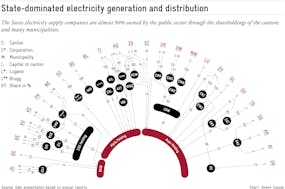The current heated political debate in Switzerland is not just about the country’s future relationship with the European Union. Recent soaring temperatures and the effects of climate change have also mobilized the powerful farm lobby. True to form, farmers are now seeking extra subsidies from the taxpayer to cover new market challenges.
The wish list is impressive. Rising insurance premiums for weather-related crop losses should be co-financed by the public sector. Even more bizarrely, while the federal government is lowering customs duties on imports of roughage because of the drought, the farmers’ union is demanding an immediate halt to already approved beef imports. In other words, customs protection for animals is to be relaxed unilaterally, while diverse agricultural import duties for consumers are to be tightened further. Consumers seem to be the last priority for Swiss agricultural policy.

Farm in Hüttikon around 1930, when farming in Switzerland used to be more of an entrepreneurial activity. (ETH-Bibliothek Zürich, Bildarchiv)
But even at the other end of the production chain, in farms themselves, matters are anything but pleasing, irrespective of this summer’s heatwave. More than 4,000 pages of laws, ordinances and other regulations determine everyday farming life to the last imaginable detail.
This extensive loss of self-responsibility is largely a result of very successful agricultural lobbying over the years. Swiss farmers have managed to claim one of the world’s highest shares of transfer payments, alongside assorted other preferential treatments, from the state. The rules on direct payments to farmers alone cover 188 pages, while regulations on hygiene in milk production make up just 16.
Soon, every farm will need a legally trained hand to track the rules. The forest of regulation is preventing Swiss farmers from developing their entrepreneurial spirit. Instead they end up as “bogus” entrepreneurs, busy with implementing agricultural policy under a government mandate.
Proud agricultural entrepreneurship could be possible, but it would require a broad-based will to deregulate. That would create scope for innovation, and farmers’ currently fallow entrepreneurial potential could finally be recultivated without any further burden on taxpayers and consumers.





